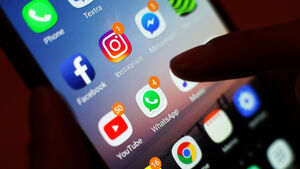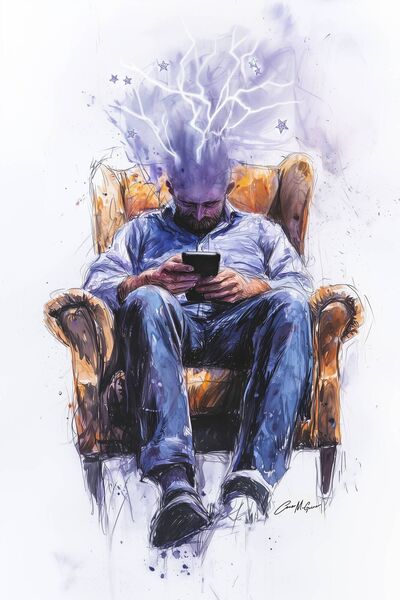Social media has left us with a crisis of reality

A peculiar malaise creeps across Ireland's digital landscape, manifesting in hunched shoulders and downcast eyes in the blue glow illuminating faces from Louth to Louisburgh. I observed it most acutely in a local café where patrons sat in self-imposed silence, each communing not with their fellow humans but with the rectangular oracle in their palm. Their coffee grew cold while the ghosts of unheard conversations surely wept into their spectral espressos.
Social media, that inescapable leviathan born on distant American shores, has colonised Irish consciousness with more efficiency than any empire of old. We are no longer merely users; we are the used - commodities to be harvested, our attention packaged and sold to the highest bidder. Instead, the platforms that promised to connect us have rendered us islands, each floating in our own algorithmic archipelago of curated content and confirmation bias. I speak as one guilty of this daily distraction.
To understand this distinctly modern affliction, one must first acknowledge that we are no longer living in reality but rather a "hyperreality" - a magnificent simulation where the map has outlived the territory. Baudrillard, that prescient French philosopher whose insights have proven uncannily accurate, would observe our digital descent with grim vindication. His concept of simulacra - copies without originals - perfectly describes the Instagram influencer's carefully constructed life, a performance with no authentic counterpart.
Consider the scene we witness in our tourist hotspots: visitors by the dozen, backs turned to our natural marvels, contorting themselves for the perfect selfie. The experience itself has become secondary to its documentation, the moment sacrificed at the altar of its representation. The landscape exists not as a place of contemplation or wonder but as a backdrop, a digital prop in personal mythmaking.
Europeans have particular cause for concern. With its deep philosophical traditions from Aristotle to Heidegger, our continent has long grappled with questions of reality and representation. Now, we find ourselves unwitting participants in a vast experiment that renders these questions not academic but existential. The simulacrum has escaped the lecture hall and invaded our living rooms, bedrooms, and every waking moment.
We Irish, with our rich storytelling heritage, have watched as digital yarns spun by algorithms replace the tales once shared around frothy pints of Guinness. In the plazas of Madrid and the piazzas of Rome, in Berlin's beer gardens and Athens' tavernas, Europeans move through physical space like reluctant visitors while their real existence unfolds in a parallel digital universe. Their dopamine receptors have been hijacked by the constant drip-feed of likes and notifications, turning them into walking pharmacological experiments. The laboratory rat hitting the lever is us, desperately tapping for our next digital fix.

Our feeds have become firehoses of fabricated feeling, where genuine emotional connection drowns in a deluge of performative outrage and calculated vulnerability. Facebook and its algorithmic siblings don't merely reflect our social connections; they warp them through a funhouse mirror where the loudest, most extreme voices dominate the conversation. The platforms have pivoted from networks built around actual relationships to content delivery systems that serve us whatever will keep our eyes glued to the screen longest.
With their tradition of intellectual resistance, the French have begun to push back. Mobile phones are banned in Parisian schools, a small rebellion against the digital tide. A movement of "digital detox" retreats has sprung up in Provence, where harried urbanites pay handsomely to surrender their devices and rediscover the analogue pleasures of conversation, contemplation, and connection. These are hopeful signs, yet they remain exceptions in a landscape dominated by ubiquitous connectivity.
What began as charming digital mirrors of our everyday lives - those clunky early platforms filled with trivial updates from actual friends - have metastasised into addiction machines of bewildering sophistication. The Simulation, as we might call it, now rearranges our experience of reality around whatever generates revenue from our attention. B.F. Skinner's pigeons have nothing on us; at least they received actual nourishment for their trouble. Skinner's experiments showed pigeons pecking obsessively at discs when rewarded randomly, demonstrating how immediate gratification can override natural behaviours. Cultural critics see disturbing parallels between Skinner's pigeons and modern humans scrolling through social media platforms.
This isn't merely technological evolution; it's the commodification of consciousness itself. The visualisation of both material and immaterial aspects of our lives through immersive technologies creates new forms of experience, but these experiences are increasingly mediated through commercial platforms. The companies harvesting our attention have transformed into political behemoths, their executives sitting before European Parliament committees not as supplicants but as sovereigns. Their power to shape public opinion through algorithmic manipulation represents perhaps the greatest threat to European democracy since the Cold War's darkest days.
The paradox is exquisite - never has more information been available, yet never has truth seemed so elusive. We've created a multiverse of competing realities, each propagated in its own algorithmic silo. When no one knows what to believe, anyone can be made to believe anything. The result is an electorate divided, disoriented, and disempowered, which manifests differently across Europe's diverse political landscape but is universally corrosive to democratic function.
With their historical sensitivity to propaganda, Germans have been particularly vigilant regarding 'fake news' and now patrol their digital borders with all the joyless efficiency of motorway traffic wardens. Their historical guilt has transformed into algorithmic vigilance, yet alternative facts still multiply in their feeds like bacteria in a sauerkraut factory. The Italian government struggles with anti-vaccination movements fuelled by conspiracy theories spreading through WhatsApp groups faster than a Vatican rumour about a pregnant nun. The Czech Republic contends with disinformation campaigns that flow through social media like digital sewage, polluting the information ecosystem.
What's the solution to this continental crisis? Perhaps we start by recognising the Simulation for what it is - not progress but regression, a failed experiment in addictive technology. Maybe we can develop new social norms prioritising autonomy and authenticity over digital spectacle, using technology to enrich our lives rather than control them.
We can also learn to recognise the chasm between our curated online personas and our authentic selves, between the digital world as promised and as experienced. This awareness is the first step toward reclaiming our agency.
The moment is ripe for a European digital renaissance that addresses this crisis' individual, societal, and spiritual dimensions. Until we collectively awaken from this digital hypnosis, we remain captive in Plato's cave, mistaking shadows on screens for reality, entranced by the flicker of notifications, our perception of self and society increasingly determined by algorithms we neither understand nor control.
Unfortunately, it may be too late for a whole generation of teenagers, already fraught with anxiety levels fuelled by the disconnect between their online selves and the less-pigmented physical reality. The most human response might simply be to look up, put the phone down, and rediscover the world beyond the screen - a world that, unlike its digital counterpart, doesn't exist solely to exploit us.
Meanwhile, we've become a species of digital Cyclopes, experiencing life's grand theatre through five-inch rectangles. There we stand, arms extended like existential selfie sticks, frantically collecting pixels of sunsets we'll never actually see. "Breathtaking view!" types the woman who witnessed nothing but her screen brightness adjusting to the fading light. The celestial spectacle continues its cosmic performance whether we document it or not – our modern conundrum isn't whether to be or not to be, but whether to post or not to post.
And that, dear reader, is a reality worth living in - an uncurated reality of depth and presence, of conversation and contemplation, of connection not mediated by screens but experienced in the irreplaceable fullness of being truly, physically, gloriously here, the only antidote to our culture of pervasive anxiety.





